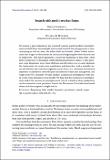Search with multi-worker firms
Author(s)
Acemoglu, Daron; Hawkins, William B.
DownloadAcemoglu-2014-Search with multi-wo.pdf (852.1Kb)
PUBLISHER_CC
Publisher with Creative Commons License
Creative Commons Attribution
Terms of use
Metadata
Show full item recordAbstract
We present a generalization of the standard random-search model of unemployment in which firms hire multiple workers and in which the hiring process is time-consuming as well as costly. We follow Stole and Zwiebel (1996a, 1996b) and assume that wages are determined by continuous bargaining between the firm and its employees. The model generates a nontrivial dispersion of firm sizes; when firms' production technologies exhibit decreasing returns to labor, it also generates wage dispersion, even when all firms and all workers are ex ante identical. We characterize the steady-state equilibrium and show that, with a suitably chosen distribution of ex ante heterogeneity across firms, it is consistent with several important stylized facts about the joint distribution of firm size, firm growth, and wages in the U.S. economy. We also conduct a numerical investigation of the out-of-steady-state dynamics of our model. We find that the responses of unemployment and of the vacancy-to-unemployment ratio to a shock to labor productivity can be somewhat more persistent than in the Mortensen–Pissarides benchmark where each firm employs a single worker.
Date issued
2014-10Department
Massachusetts Institute of Technology. Department of EconomicsJournal
Theoretical Economics
Publisher
The Econometric Society
Citation
Acemoglu, Daron, and William B. Hawkins. “Search with Multi-Worker Firms.” Theoretical Economics 9, no. 3 (September 2014): 583–628.
Version: Final published version
ISSN
19336837
1555-7561